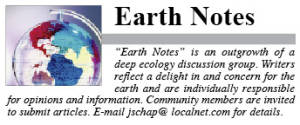Toward a Way to Make People Care
By Frank Daggett
Special to The News
 On April 21, this paper carried Gail Geraghty’s “Viewpoints†piece, “We need a way to make people care.†She briefly reviewed local Earth Day plans, noted the strong environmental conscience in our region, and gave a very comprehensive listing of many problems that beset the environment. But she didn’t have any real insights on the question she raised: How do we make people care?
On April 21, this paper carried Gail Geraghty’s “Viewpoints†piece, “We need a way to make people care.†She briefly reviewed local Earth Day plans, noted the strong environmental conscience in our region, and gave a very comprehensive listing of many problems that beset the environment. But she didn’t have any real insights on the question she raised: How do we make people care?
The question implies, first of all, that there are a number of persons, a collective “we,†who do care and want to make others share our caring. A second question, unstated but lying under the surface, is why should people care?
Many prominent environmentalists, scientists, authors, university professors, and just plain folks have shared Geraghty’s concern, but haven’t been able to come up with a way as yet. After all, if “people†don’t care about global catastrophe, what on earth will motivate them?
Last week, I was fortunate to meet Carl Safina, noted scientist, author, and founder of the Blue Ocean Institute. Safina began his presentation with a quote from the prologue of his new book, The View from Lazy Point: A Natural Year in an Unnatural World. He too gave a comprehensive list of environmental problems and alarming trends, focusing on the oceans and ocean species (including people). He spoke convincingly about the need for compassion for people already impacted by regional climate change, of respect for their dignity as humans, and the need for an ethic that would make people care, that would guide them in their actions, invoking Aldo Leopold and his call for a land ethic.
The problem is found in a view expressed in Safina’s quote from his book: He rejects religion and philosophy as “medieval institutions†incapable of solving modern problems. But are they? And is a “modern†world without them any more capable of solving the great questions of meaning and values? Following his talk, I asked Safina to comment on the fact that the ideas he expressed so powerfully: compassion, human dignity, and morality — had their roots in the very “medieval†religion and philosophy he was rejecting as antiquated, obsolete, and irrelevant. Honestly and somewhat poignantly, Safina said that he owed his own grounding in these concepts to his own early upbringing in religious school.
Leopold spoke of a land ethic, but his classic book, A Sand County Almanac, never actually got around to proposing one. Leopold was a keen observer of nature, and like many who spend time in and are inspired by the natural world, a thinker. Trained as a scientist, he possessed a very human appreciation of the beauty and joy to be found in nature, he saw the need for an ethical framework to address the dangers facing nature — and us — but left it to others to build that framework.
Science can detect dangers, but it takes value judgments to craft the responses that address the danger in a way that also protects human dignity.
We’ve been here before. The periods of the Black Death or the Great Plague, of the Hundred Years’ War and the Second World War all threatened the existence of civilization, yet caused a re-examining of ancient traditions and philosophies, and the reinterpretation of religion in the light of present circumstances. We are still in the aftermath of the great planetary trauma of World War II. Earlier crises contributed to the flowering of philosophy, morality, ethics and religiously-based responses to those crises. Today, churches, mosques, universities, and open-minded public discourse may again be the places where real, human solutions are found. Ancient religious and philosophical traditions have saved us before, and they can again, if we have the courage to re-examine them, along with new and different ideas and traditions.
Frank Daggett works in Campus Ministry and occasionally teaches math at Saint Joseph’s College.

